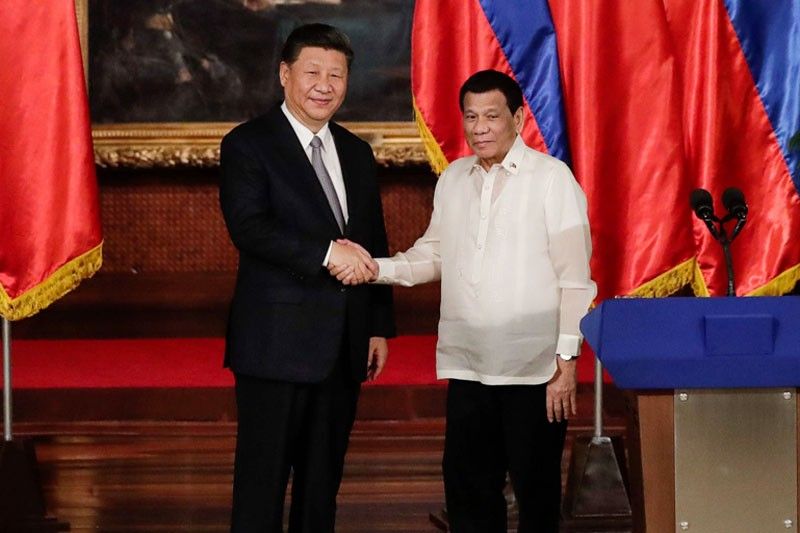Duterte-Xi verbal agreement not policy — Locsin

MANILA, Philippines — President Duterte’s verbal fishing agreement with Chinese President Xi Jinping is “not a policy” and “cannot be enforced,” foreign affairs chief Teodoro Locsin Jr. said yesterday, contradicting presidential spokesman Salvador Panelo’s claim that it is “valid and binding.”
“No. We’re not,” Locsin said in an interview on ANC’s “Headstart” when asked if the informal agreement allowing the Chinese to fish in the Philippines’ exclusive economic zone (EEZ) is a policy being implemented.
Locsin also called the supposed deal “pointless.”
“The verbal agreement cannot be enforced. It cannot be enforced on us, because it’s verbal,” Locsin said. “You need a document to prove an agreement, that’s just the way it is.”
The President, he said, entered into a verbal agreement with Xi as he might have been led to believe that there was a surplus of allowable catch in the West Philippine Sea.
Duterte last week cited such an agreement to clarify his earlier statement that China could not be stopped from fishing in the Philippines’ EEZ.
The President said Filipino fishermen now have access to Panatag (Scarborough) Shoal because of the agreement reportedly forged in 2016.
For maritime and legal experts, the supposed verbal agreement should be made public.
“The President is not the state and he cannot do this on his own. It should be in writing and should be transparent,” human rights lawyer Chel Diokno said at a briefing yesterday.
“The public should be able to know whatever the content of that agreement is,” he added.
University of the Philippines Institute for Maritime Affairs and Law of the Sea executive director Jay Batongbacal said the Philippines is under no obligation to give any party access to its waters under the United Nations Convention on the Law of the Sea (UNCLOS).
“The obligation to share is only when there is a surplus, those that we cannot harvest. But with the declining fish catch, we definitely do not have a surplus. So we do not have the obligation to give access,” he said.
The Philippines has been prioritizing its municipal waters and not the commercial waters or the country’s exclusive economic zone.
“In doing so, we are allowing the other side to exhaust whatever resources there are in the West Philippine Sea,” Batongbacal said.
“What if we realize and decide to prioritize that, we can no longer get any resources there, what is the point?” he added.
He stressed every administration is mandated to protect the country’s marine resources.
“The state shall protect the nation’s marine wealth in archipelagic waters, EEZ and reserve its enjoyment to Filipino citizens. It’s been there as to what the government should do,” Diokno said.
“But our government has been remiss in its duties and constitutional obligations to protect our marine resources and fisherfolk. I have never heard from him (Duterte) any utterance in the real condition of our fisherfolk, the West Philippine Sea or even food security in the country,” he added.
“He has the right and power to know these things. We don’t have to be the ones to tell him,” Diokno said.
‘Politically motivated’
Meanwhile, Supreme Court justices dismissed as possibly politically motivated the filing of a petition seeking to compel the government to protect marine resources in the West Philippine Sea from Chinese poaching and other environmentally destructive activities.
Associate Justice Alfredo Benjamin Caguioa said Zambales and Palawan fishermen might be asking too much in their petition for writ of kalikasan for protection of the environment at Panatag Shoal, Ayungin Shoal and Panganiban Reef.
During interpellation on Tuesday, the magistrate asked counsels of petitioners Diokno and Andre Palacios of the Integrated Bar of the Philippines (IBP) why they want the court to compel the executive branch to run after violators of environmental laws in 2012, 2013 and 2015.
“You want to initiate criminal suits against these people in the vessel who did these things in 2012, 2013 and 2015. Are you not asking for the impossible? These vessels may no longer be there, and you cannot even certify as a fact that they are still there. Are you not asking for the impossible?” Caguioa stressed.
Palacios argued that the enforcement of environmental laws should include prosecution of violators.
“If it’s just a matter of prosecuting fishermen, I think the return (of the writ) has already shown the efforts of the respondents in complying with environmental laws,” Caguioa said.
“But if you’re saying that that is not enough, we should file cases against the people... by the arbitral tribunal, those inside the ships, are you not asking for the impossible?” the magistrate pointed out.
Caguioa was justice secretary in 2015 and was supposed to be among the former officials that the petitioners wanted to be held liable.
Associate Justices Andres Reyes Jr. and Ramon Paul Hernando questioned the motive of the petition.
Reyes said he believes the petition is “politically motivated to embarrass country.”
“Even if we say yes, how can the government guard the shoal 24 hours a day and spend money on that when we have other important things to do in this country,” he stressed.
Reyes stressed that the Court has no business interfering in duties of the executive branch as what the petitioners are batting for. “We cannot interfere in the management of the country,” he pointed out. – With Edu Punay, Louise Maureen Simeon
- Latest
- Trending































